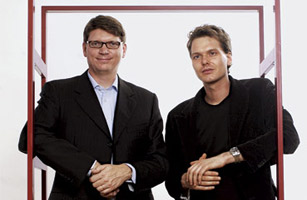
It's not often that an entire industry gets turned upside down by a couple of idealists, but Niklas Zennstrom and Janus Friis, the founders of Skype, are doing just that.
They are a part of the VOIP (voice-over-Internet protocol) movement that is redefining the way telephone calls are made. VOIP calls are placed over the Internet, using the same underlying transport technology that a Web browser uses. Their particular spin has been to create a business model in which the basic service is free. Something for nothing is the code of the Web. If you become a Skype user, you can use your computer to call any other Skype user free anywhere in the world. Geography is rendered meaningless, which is significant because traditional phone companies have charged prices based loosely on the distance a call travels. But it has been quite a few years since distance has had any strong connection to the cost of a call.
This isn't the first big idea for the Swedish Zennstrom, 39, and the Danish Friis, 29. The entrepreneurs teamed up in 2001 to develop the file-sharing application Kazaa. The controversial software, which lets users share music and videos at no charge online, became the most popular of the peer-to-peer services.
The pair sold Skype to eBay last year for $2.6 billion but continue to run it. So how do they expect to make money from a venture whose service cost is virtually zero? By selling add-on features such as customized ring tones and voice-mail subscriptions. In their view, talk shouldn't be cheap; it should be free. And by making pricing independent of distance and free within their network, the duo has sparked a revolution in communication that has tens of millions of customers communicating across the globe. For these men, Skype is as much a mission to bring the world together as it is a business.
Gosling, a Sun Microsystems VP, founded Java technology